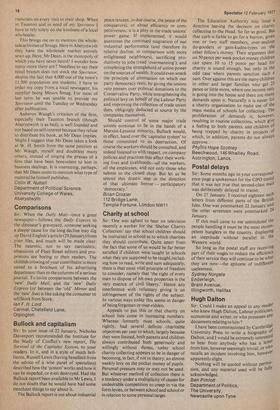Bullock and capitalism
Sir: In your issue of 22 January, Nicholas Davenport recommended the Institute for the Study of Conflict's new report, The Survival of the Capitalist System, to your readers. In it, and in a style of much brilliance, Russell Lewis (having benefited from the advice of a wise panel of specialists) described how the 'system' works and how it can be impeded, or even destroyed. Had the Bullock report been available to Mr Lewis, I do not doubt that he would have had some trenchant things to say about it.
The Bullock report is not about industrial peace (except, in due course, the peace of the conquerors), or about efficiency or competitiveness: it is a ploy in the trade unions' power game. If implemented, it would guarantee the continued stagnation of our industrial performance (and therefore its relative decline, in comparison with more enlightened neighbours), sacrificing productivity to jobs (read 'overmanning'), and completing the stranglehold of union power on the sources of wealth. It could even wreck the principle of alternation on which our party democracy rests, by giving the unions veto powers over political donations to the Conservative Party, while strengthening the political levy on behalf of the Labour Party and improving the collection of trade union dues, obligingly deducted at source by the companies themselves.
Should control of some major trade unions continue to be in the hands of a Marxist-Leninist minority, Bullock would, in effect, hand over the 'capitalist system' to those committed to its destruction. Of course the workers should be consulted, and indeed listened to with respect, on company policies and practices that affect their working lives and livelihoods—all the workers, all the employees,, and not only those who submit to the closed shop. But let us be spared this drastic step in the direction of that ultimate horror — participatory 'democracy.'
Brian Crozier 112 Bridge Lane, Temple Fortune, London NW11


































 Previous page
Previous page